Where the Jobs Are: Breaking stereotypes, youths seize opportunities in cleaning, waste management sectors
In the first instalment of a new weekly Where the Jobs Are series, we focus on the cleaning and waste management sectors, which are quietly attracting a growing crop of ambitious professionals keen to make their mark amid heightened interest in climate change and environmental sustainability.
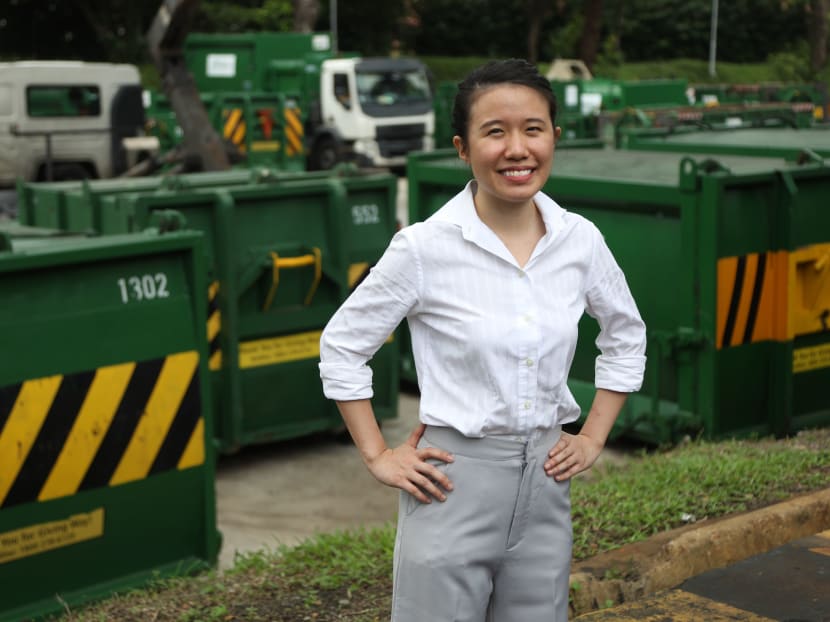
Ms Faith Lee is part of a team overseeing the planning and control of centralised operations for waste management firm SembWaste’s recycling activities.
As fresh graduates and other young Singaporeans face a challenging job market amid the economic downturn, TODAY is running an eight-part weekly Where the Jobs Are series, shining a spotlight on sectors that may be overlooked but are offering interesting opportunities.
In the first instalment, we focus on the cleaning and waste management sectors, which are quietly attracting a growing crop of ambitious professionals keen to make their mark due to a heightened interest in climate change and environmental sustainability.
- The cleaning and waste management sectors are part of the environmental service industry, which is teeming with job opportunities
- Young employees told TODAY that some of the jobs might be dirty, but there is room for advancement
- One young worker said the industry is primed for change and the youth can shape its future
SINGAPORE — After an uneventful stint working a desk-bound job about five years ago, Mr Shawn Kuek made a decision that few Singaporeans in their 20s would: He became a cleaner.
The initial months were tough for the 25-year-old.
“At the start of my career, I felt very pai seh (Hokkien for embarrassed) because I work for a cleaning company,” he said. “It’s a dirty job.”
Mr Kuek, who has a tourism and hospitality diploma from Kaplan Higher Education Academy, took up the position at cleaning firm LS 2 Services after working at the front desk of a hotel. He left because he did not like staying still and repeating mundane tasks for nearly 12 hours.
Soon after he joined the cleaning profession, he recalled older Singaporeans giving him judgemental looks and wondering why a “young kid” was doing a job that entailed keeping toilets spick and span.
“I’ll just smile and not say anything,” Mr Kuek said, adding that he was fortunate to have supportive friends and family members.
These days, such harsh comments no longer faze him and his grit has even propelled him to a supervisory role.
He is his firm’s youngest Singaporean project supervisor, managing about 20 cleaners who keep the estate spotless for some 7,000 Housing and Development Board residents along Upper Boon Keng Road and Sims Drive.
It is a challenging job, in part due to inconsiderate residents who dump their waste indiscriminately, but Mr Kuek is determined to stay the course.
“Among my peers, I think I lose out to quite a few of them (financially)... but, over the years, I realised there’s an opportunity to earn more than them,” he said, referring to his ambitions of owning a cleaning company someday.
“The cleaning industry will never die.”
Mr Kuek takes home more than S$2,000 a month right now.
He is among a group of youth who are leaving their imprint on the growing environmental service industry, which includes sectors such as cleaning and waste management.
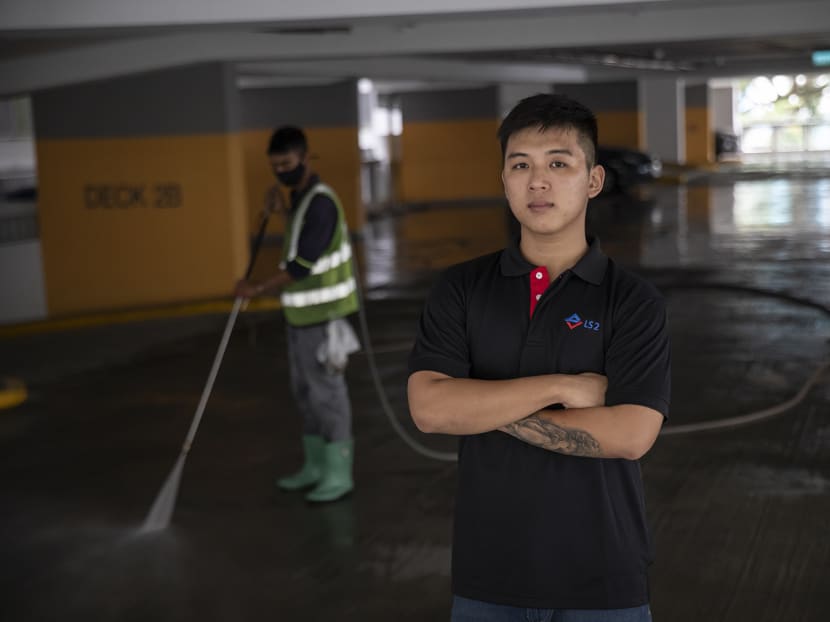
Ms Faith Lee, 25, said that she was inspired to join SembWaste, a waste management company, after attending a class on business transformation as a business undergraduate at the National University of Singapore.
As part of a class project, Ms Lee and those in her group identified the waste management and cleaning sectors as those primed for transformation.
“If you take a broad look at the industry, it has a heavy reliance on manpower and has an ageing workforce. This tells you that sooner or later, this essential business would need to change.
“I thought to myself that it would be nice… to have a career where you can see that kind of change.”
Ms Lee, now a senior executive at SembWaste, has had no regrets since she embarked on her career in 2018, having straddled job functions from outreach and education to business development.
At present, she is part of a team overseeing the planning and control of centralised operations for SembWaste’s recycling activities, which span the company’s materials recovery facility, construction and demolition plant as well as operations of Ezi, the firm’s recycling platform that comes with a mobile application.
“The waste management industry is really something that aligns with my personal values,” Ms Lee said, explaining that she had always wanted a career where she can effect positive change.
She declined to reveal her salary, but said that it was “decent and not too far off from public-sector pay”.
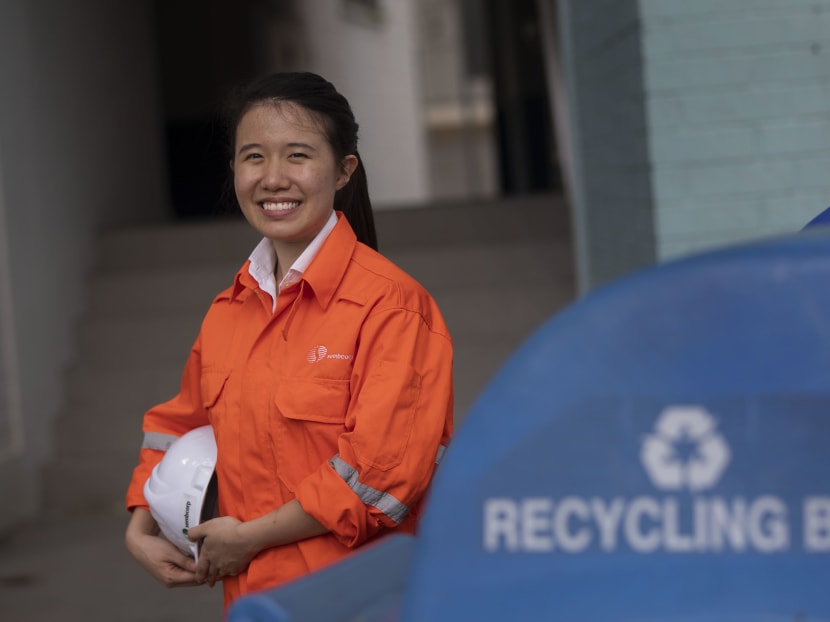
DIGITAL PUSH
The Ministry of Manpower (MOM) told TODAY in a statement with the National Environment Agency and Workforce Singapore that as of June last year, the environmental service industry employed almost 74,000 people across a range of jobs such as waste treatment facility engineers and data analysts.
At the end of last month, there were 1,600 openings in the industry. Of these, nearly 90 per cent are jobs, with the rest being company-hosted traineeships, attachments and training places.
The many entry-level PMET (professional, manager, executive and technician) openings include those for mechanical design engineers, service delivery leads and executives in sales, operations, business development, project management and logistics.
The agencies said that seven in 10 of the available jobs are non-PMET roles such as cleaners, facility service specialists and drivers.
While the sector is traditionally seen as labour-intensive, technology is rapidly changing that.
The authorities said that there has been an uptick in the adoption of technology and digital solutions by environmental service firms, which has helped to simplify and automate jobs. These include automated scrubbers for cleaning floor surfaces and sensors at waste collection facilities.
With the digital transformation still under way, jobs are being redesigned and “exciting” roles have emerged, including those in sustainability management, research and development, and engineering, the agencies said.
This digital push has also opened up opportunities for employees to pick up new and relevant skills.
Some employers told TODAY that this was likely to improve workers’ wages.
Mr Herbert Lim, operations director at LS 2 Services, foresees the use of technology could help reduce manpower needs. This would allow excess funds to be channelled towards improving the salaries of workers operating the machines.
The 72-year-old said that his company is in the midst of exploring ways to incorporate technology into its daily operations.
LS 2 Services employs 1,900 people in Singapore and is looking to add 30 to its headcount to fill roles such as general cleaners, team leaders and multi-skilled workers to operate various cleaning equipment.
The authorities said that while most of the openings in the cleaning industry — which is covered by the Progressive Wage Model — are entry-level, entrants opting for cleaning or supervisory roles do not necessarily have to start at the bottom. Depending on their skills and qualifications, they may start at a more senior level.
The Progressive Wage Model is a framework where wages are pegged to skills, productivity and career development. It covers workers in the cleaning, security and landscaping sectors.
Mr Owen Yeo, director of Enerprof, a supplier of waste management equipment, believes that the introduction of technology could be a good way to infuse new blood into an industry typically staffed by older people.
“The usage of technology allows younger people to work with something that they are more comfortable with,” the 32-year-old said. “It also allows more flexible work arrangements if our office or database is in the ‘cloud’, so they don't have to be restricted to a physical office all the time.”
Enerprof has 12 full-time employees and is looking for an operations and warehouse supervisor. Whenever a project requires, the company also hires part-time and contract workers.
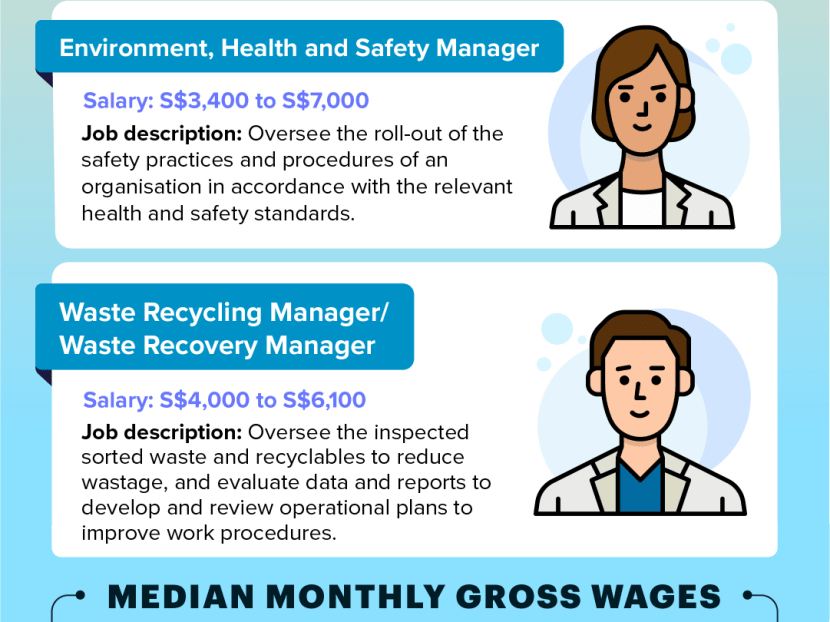
The government agencies said that new hires could progress to take up specialist and managerial positions.
For example, PMET entrants usually start in executive roles but can climb the ranks to assume managerial positions such as a cleaning operation manager and waste recycling manager, before moving on to being an operations director or general manager.
.embed-container { position: relative; padding-bottom: 56.25%; height: 0; overflow: hidden; max-width: 100%; } .embed-container iframe, .embed-container object, .embed-container embed { position: absolute; top: 0; left: 0; width: 100%; height: 100%; }BREAKING THE MOULD
Even so, the biggest hurdle to rejuvenating the industry is still the stigma that surrounds the sector.
Mr Yeo of Enerprof said: “It stems from when we were young and told: ‘If you don’t study, you go collect rubbish’.
“It kind of sticks and it is not easy to hire people, which makes us appreciate those we manage to hire.”
Mr Neo Hong Keat, SembWaste’s managing director, is optimistic about the industry’s future.
“A few years ago, I would say it was difficult to recruit young people. But I find that the youth today are increasingly interested in the waste management business and we now have more young people joining us,” he said.
“We believe it is because they have a keen interest in climate change and environmental sustainability, and they want to play an active part in pushing the agenda, either in the way they lead their lives or by working in the sustainability space.”
Other young professionals have given the industry a go, albeit briefly.
Mr Jack Ng, 24, secured a traineeship with Enerprof, where he managed the company’s fleet of drivers and helped to plan the firm’s day-to-day operations.
The mechanical engineering graduate from the Singapore University of Technology and Design also helped out with a bin replacement programme for a client of Enerprof’s.
Mr Ng, who joined the company in August last year and received a monthly stipend of about S$2,500, said that these hands-on experiences allowed him to gain a better understanding of the realities on the ground, so that he could devise more efficient plans for the company.
“It also allowed me to empathise with the workers, so that I didn’t overburden them,” he told TODAY last month.
Mr Ng resigned from the position last Tuesday because of parental objections to his occupational choice, a sign of the challenges confronting the industry when it comes to retaining young employees.
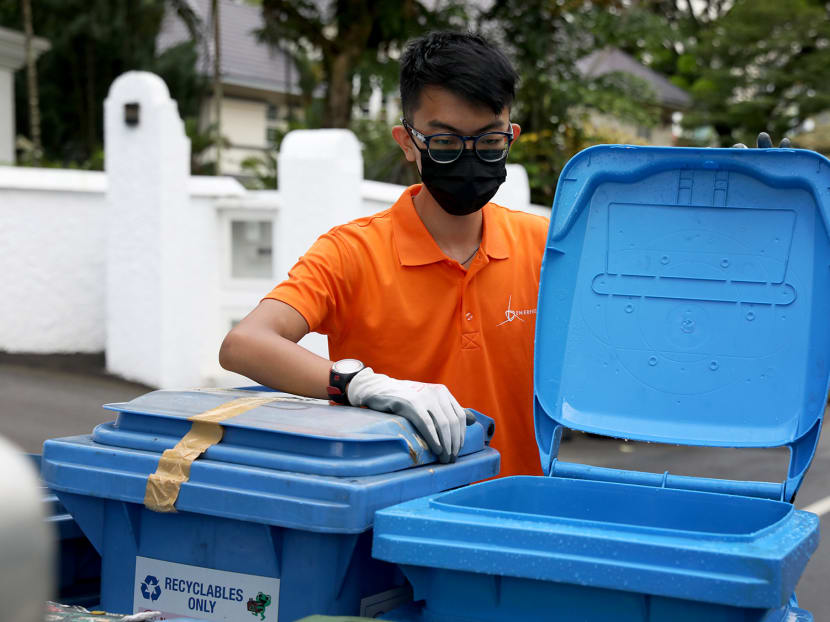
KEEPING AN OPEN MIND
While the young employees said that no specific experience is needed to get one’s foot in the door, they stressed that keeping an open mind and showing a willingness to learn were key to thriving on the job.
They said that hard skills can be learnt on the job, but there are a range of programmes to equip Singaporeans with the know-how that would stand them in good stead.
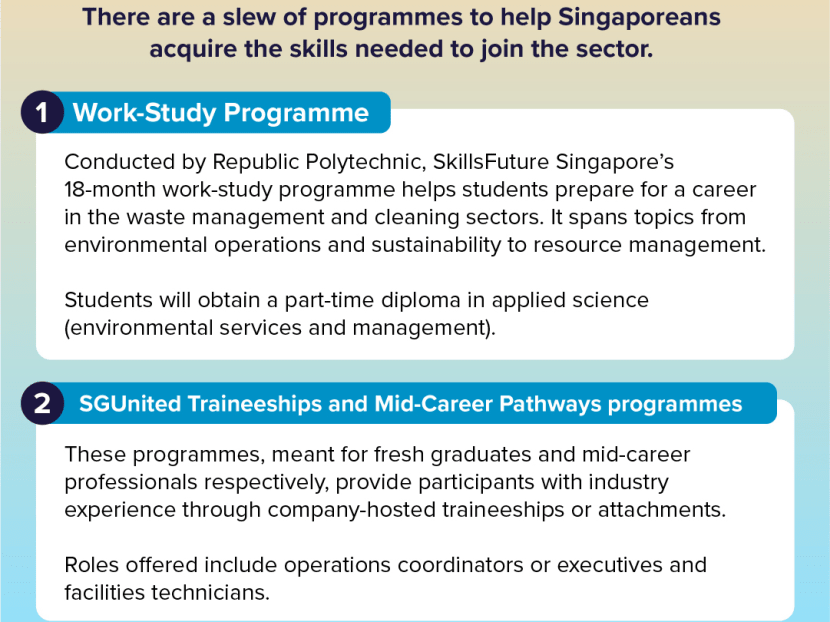
These include a work-study programme from government agency SkillsFuture Singapore that culminates in a part-time diploma in applied science (environmental services and management) and career conversion programmes by Workforce Singapore.
For instance, the Professional Conversion Programme for waste management professionals equips mid-career PMET entrants with competencies in areas ranging from leadership and project management to operations.
Aside from doing one’s part to keep the environment clean, Ms Lee from SembWaste said that young adults could be a force for change in the industry.
“It’s our responsibility to make use of that platform as a young person… and put a fresh perspective on something that is essential and due for change.”











